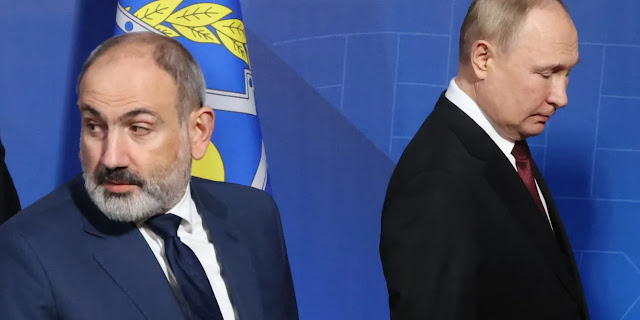The latest of Putin's embarrassing gaffes came when a key ally of Russia announced military drills with the US.
Russian President Vladimir Putin and Armenian Prime Minister Nikol Pashinyan at the CSTO welcoming ceremony in Yerevan, Armenia, in November 2022.Contributor/Getty Images
Later this month, Armenia will hold a joint military drill with the US.
Despite being a longtime ally of Russia, the nation has frequently voiced its displeasure with the latter.
This includes expressing an intent to quit the CSTO, which is commanded by Russia, and declining to host its military exercises.
The US and Armenia will stage a joint military drill later this month, the latest in a string of seeming slights against Russian President Vladimir Putin by the country. Armenia has long been seen as a loyal Russian friend.
The exercise, called "Eagle Partner 2023," according to Armenia's defense ministry, will take place between September 11 and September 20 and is intended to help train its forces to participate in international peacekeeping missions.
85 US soldiers and 175 Armenian soldiers would participate in the exercise, a US military spokesperson told Reuters.
Armenia, which was formerly a part of the Soviet Union and is currently a member of many international organizations led by Russia, and Russia have had a close relationship for many years. A Russian military facility is also located in Armenia.
But over the past two years, Armenia's displeasure with Russia has become clear.
During recent border conflicts with its neighbor Azerbaijan, Armenia requested aid from the CSTO, Russia's version of NATO. The absence of military assistance from the alliance led by Russia infuriated the nation's prime minister, Nikol Pashinyan.
The answer, according to Pashinyan, was "depressing" and "hugely damaging to the CSTO's image both in our country and abroad," and during a summit, he physically separated himself from Putin and refused to sign a draft declaration.
He stated in May that if the alliance's benefits to his country weren't demonstrated, Armenia might leave it.
Armenia ceased conducting joint military exercises with Russia in January, and in June, Pashinyan claimed that his nation was "not Russia's ally in the war with Ukraine" and felt caught between Russia and the West.
This month, Pashinyan declared that it was a "strategic mistake" to rely solely on one country—in his case, Russia—to guarantee security.
Insider was told by experts that the former Soviet Union's member states' displeasure with Russia has increased as a result of Russia's invasion of Ukraine. These countries now question Russia's ability to protect them and even worry that they could end up Russian targets themselves.
According to Thomas Graham, co-founder of Yale University's Russian, East European, and Eurasian Studies program, the invasion has exacerbated Russia's decline in the area, strengthening Chinese and Turkish operations there.
Russia's regional reputation as a security provider has been left "in tatters," according to Jaroslava Barbieri, a University of Birmingham expert on Russia and post-Soviet republics.
The most recent development, according to Kremlin spokesman Dmitry Peskov, is alarming, "particularly given the current scenario. We will thus carefully examine this news and keep an eye on the situation, according to Reuters.
Despite being a longtime ally of Russia, the nation has frequently voiced its displeasure with the latter.
This includes expressing an intent to quit the CSTO, which is commanded by Russia, and declining to host its military exercises.
The US and Armenia will stage a joint military drill later this month, the latest in a string of seeming slights against Russian President Vladimir Putin by the country. Armenia has long been seen as a loyal Russian friend.
The exercise, called "Eagle Partner 2023," according to Armenia's defense ministry, will take place between September 11 and September 20 and is intended to help train its forces to participate in international peacekeeping missions.
85 US soldiers and 175 Armenian soldiers would participate in the exercise, a US military spokesperson told Reuters.
Armenia, which was formerly a part of the Soviet Union and is currently a member of many international organizations led by Russia, and Russia have had a close relationship for many years. A Russian military facility is also located in Armenia.
But over the past two years, Armenia's displeasure with Russia has become clear.
During recent border conflicts with its neighbor Azerbaijan, Armenia requested aid from the CSTO, Russia's version of NATO. The absence of military assistance from the alliance led by Russia infuriated the nation's prime minister, Nikol Pashinyan.
The answer, according to Pashinyan, was "depressing" and "hugely damaging to the CSTO's image both in our country and abroad," and during a summit, he physically separated himself from Putin and refused to sign a draft declaration.
He stated in May that if the alliance's benefits to his country weren't demonstrated, Armenia might leave it.
Armenia ceased conducting joint military exercises with Russia in January, and in June, Pashinyan claimed that his nation was "not Russia's ally in the war with Ukraine" and felt caught between Russia and the West.
This month, Pashinyan declared that it was a "strategic mistake" to rely solely on one country—in his case, Russia—to guarantee security.
Insider was told by experts that the former Soviet Union's member states' displeasure with Russia has increased as a result of Russia's invasion of Ukraine. These countries now question Russia's ability to protect them and even worry that they could end up Russian targets themselves.
According to Thomas Graham, co-founder of Yale University's Russian, East European, and Eurasian Studies program, the invasion has exacerbated Russia's decline in the area, strengthening Chinese and Turkish operations there.
Russia's regional reputation as a security provider has been left "in tatters," according to Jaroslava Barbieri, a University of Birmingham expert on Russia and post-Soviet republics.
The most recent development, according to Kremlin spokesman Dmitry Peskov, is alarming, "particularly given the current scenario. We will thus carefully examine this news and keep an eye on the situation, according to Reuters.
Read the original article on Business Insider

